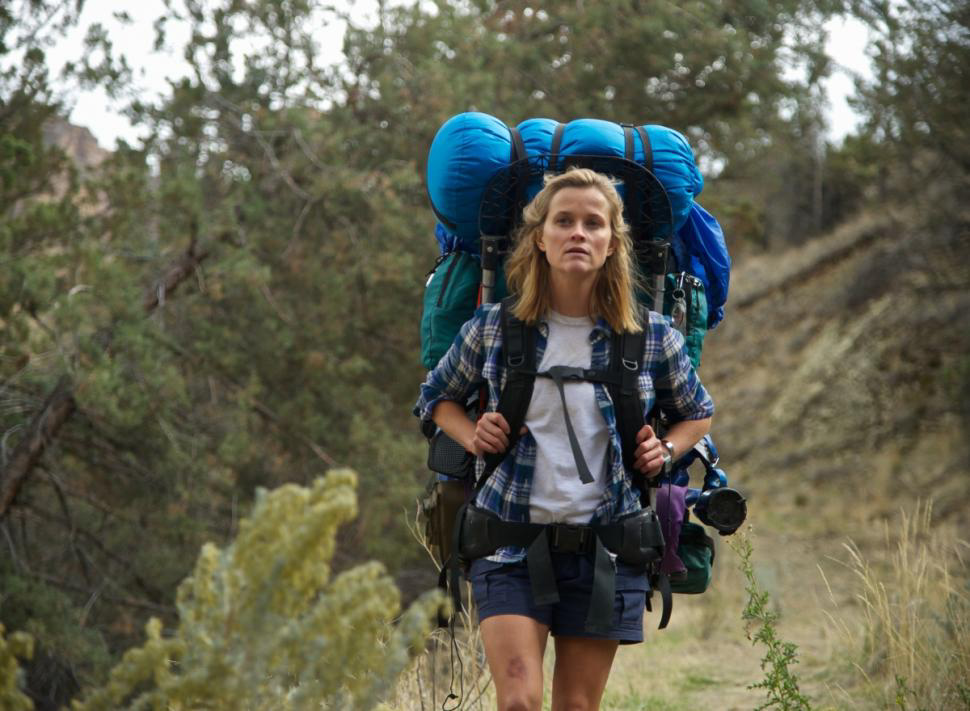When I walked into the theater to see Wild, I’ll admit I was a little skeptical at first. As someone who had not read the memoir before seeing the movie, I thought the film would be a little too Eat, Pray, Love for my taste, similar to Elizabeth Gilbert’s privileged and self-indulgent journey towards “enlightenment” by traveling through “exotic” lands.
Far from it. Wild is honest, gritty, and, like the trail that Cheryl hikes, not for the faint of heart. Reese Witherspoon, plays Cheryl Strayed, a young woman from Minnesota who loses herself in life and then finds herself on the unforgiving 1,000-mile hike that is the Pacific Crest National Scenic Trail – referred to as the PCT.
After her mother succumbs to cancer, Cheryl descends into selfish and self-destructive behavior; she becomes addicted to heroin and begins cheating on her husband with one man after another. After divorcing her husband, Cheryl decides to hike the PCT alone, starting from the desolate Mojave Desert in Southern California to the dewy forests of Oregon, in order to “walk herself back to the woman her mother raised her to be.”
The film has an unusual narrative style. The central plot point is the hike itself. Cheryl’s memories are arrhythmically woven into this trek, with the earlier ones having a more staccato feel to them, coming up as brief flashes that quickly disappear—a visual marker of Cheryl’s attempts to suppress the pain of her past. These memories are later revisited and become more fleshed out as Cheryl grapples with and tries to purge the demons plaguing her.
She begins her hike in an ironic mixture of over-preparedness and under-preparedness; she does not anticipate the physical demands of the hike (walking, carrying a heavy pack), yet brings everything but the kitchen sink in her pack (later affectionately nicknamed “Monster”). To balance the scenes of introspection, the viewer is given lighter moments. I couldn’t help but laugh when Cheryl first tries, and fails miserably, to slip on her enormous and rather unwieldy backpack and when she tries to maintain a basic semblance of personal hygiene on a 3-month long trek through the wilderness.
While Cheryl may not be a particularly likeable character, because after all she has done some pretty despicable things, the unfiltered, raw portrayal we see draws us in and evokes a measure of empathy for our protagonist. Cheryl is a person who has dealt with adversity, but she is not a broken person. The film shines in this regard– depicting a realistically flawed but resilient and strong-willed female character. We even see a budding feminist in teenage Cheryl as she reads Flannery O’Connor and debates gender stereotypes with her family.
Of all the dangers of the wilderness, including rattlesnakes, a dwindling water supply, and ripped toenails, the most frightening ones are Cheryl’s encounters with men. The viewer is repeatedly reminded of how unusual it is for a woman to hike a difficult trail alone.
When Cheryl does have to rely on the men she meets for help, we feel her struggle between risking refusing help versus putting herself in a vulnerable situation with strange men—either decision could prove fatal. Cheryl’s most tense encounter is with a leery-eyed hunter who, seeing her all alone, hurls sexually explicit taunts at her. The film keeps us waiting with baited breath to see if her journey of self-discovery will end in rape or worse.
Of course, not all the men that Cheryl encounters are dangerous, but her wariness and awareness of her vulnerability are real and relatable. At her first stop, a cook at the lodge helps her prune her pack and shares valuable information. She admits to one man, after he and his wife offer her a warm meal and shower, that she initially lied to him about hiking with her husband because she was afraid of him. Even in the wild, the greatest potential threat to a woman seems to be a man.
In the final scenes of the film, the viewer is left with wondering; while we are a product of our experiences, can we transcend our past? And despite our carefully built networks of family and friends, do each one of us, ultimately, walk alone in this world?
(Photo Source: Anne Marie Fox/Fox Searchlight Pictures)
Firdaus Arastu is an Assistant Editor at altMuslimah.





